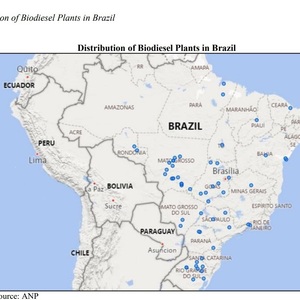Brazilian biodiesel production, use expected to increase in 2023

September 11, 2023
BY Erin Krueger
Biodiesel production in Brazil is expected to increase approximately 5 percent this year, with consumption up an estimated 6 percent, according to a report filed with the USDA Foreign Agricultural Service’s Global Agricultural Information Network.
Brazil earlier this year increased its biodiesel mandate from 10 percent to 12 percent and has indicated plans to move to a B15 mandate by 2026.
Advertisement
Advertisement
The country currently has an estimated 59 biodiesel plants, up from 57 in 2022 and 50 in 2021. Total nameplate capacity is approximately 15.2 billion liters (4.02 billion gallons), up from 13.66 billion liters in 2022 and 11.19 billion liters in 2021. Capacity use is expected at 66 percent this year, compared to 50 percent last year and 61 percent in 2021.
Domestic biodiesel production in Brazil is expected to reach 7.1 billion liters this year, up from 6.765 billion liters in 2022 and 6.87 billion liters in 2021. Biodiesel consumption is forecasted at 7.15 billion liters, compared to 6.75 billion liters last year and 6.928 billion liters in 2021. The country has not imported or exported any biodiesel over the past decade, according to the report.
Soybean oil is the primary feedstock used to production biodiesel in Brazil, at an estimated 4.3 million metric tons this year, followed by used cooking oil at 1.05 million metric tons, animal fat or tallow at 500,000 metric tons, and palm oil at 140,000 metric tons. An additional 520,000 metric tons of feedstock classified as “other” is expected to be consumed by Brazilian biodiesel producers this year.
Advertisement
Advertisement
The overall blend rate for biodiesel is expected to reach 11 percent this year, compared to 10.7 percent last year and 11.2 percent in 2021.
A full copy of the report is available on the USDA FAS GAIN website.
Related Stories
U.S. fuel ethanol capacity fell slightly in April, while biodiesel and renewable diesel capacity held steady, according to data released by the U.S. EIA on June 30. Feedstock consumption was down when compared to the previous month.
The U.S. EPA on July 8 hosted virtual public hearing to gather input on the agency’s recently released proposed rule to set 2026 and 2027 RFS RVOs. Members of the biofuel industry were among those to offer testimony during the event.
The USDA’s Risk Management Agency is implementing multiple changes to the Camelina pilot insurance program for the 2026 and succeeding crop years. The changes will expand coverage options and provide greater flexibility for producers.
The USDA’s National Agricultural Statistics Service on June 30 released its annual Acreage report, estimating that 83.4 million acres of soybeans have been planted in the U.S. this year, down 4% when compared to 2024.
SAF Magazine and the Commercial Aviation Alternative Fuels Initiative announced the preliminary agenda for the North American SAF Conference and Expo, being held Sept. 22-24 at the Minneapolis Convention Center in Minneapolis, Minnesota.
Upcoming Events










